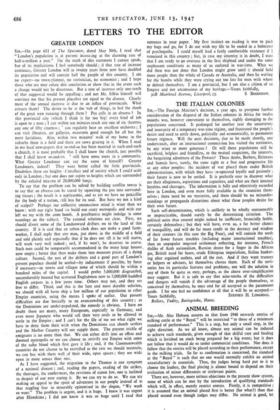THE ITALIAN COLONIES
Sta,—The Foreign Minister's decision, a year ago, to postpone further consideration of the disposal of the Italian colonies in Africa for twelve months was, however convenient to themselves, highly damaging to the populations concerned. It prolonged for another year the uncertainty and insecurity of a temporary war-time regime, and frustrated the people's desire and need to settle down, politically and economically, to permanent future regimes. Will the next decisions, due to be made shortly, one understands, after an international commission has visited the territories, be any wiser or more generous ? Or will these populations still be sacrificed, helpless and friendless, to the mutual suspicions, the interests, the bargaining adroitness of the Powers? These Arabs, Berbers, Eritreans and Somals have, surely, the same right to a free and progressive life as any other peoples: the accident of war placed them under British administrations, with which they have co-operated loyally and patiently ; their future is now to be settled. It is perfectly easy to discover what are their allegiances, aspirations and capacities, and what are their internal loyalties and cleavages. The information is fully and objectively recorded here in London, and even more fully available in the countries them- selves ; there need be no mysteries, and there should be no misunder- standings or propaganda distortions about what these peoples desire for their own future.
Such self-determination, which is unlikely to be wholly unreasonable or impracticable, should surely be the determining criterion. The political units thus created might indeed be inefficient, financially feeble, certainly defenceless ; but they will have, even so, a far better chance of tranquillity, and will do far more credit to the decency and wisdom of their creators (in this case the Big Four), and will contain the seeds of far fewer future troubles (including major international troubles), than an unpopular imposed settlement reflecting, for instance, French dislike of Arab nationalism, Russian desire for a finger in the African pie, British need for bases, crude Ethiopian imperialism, Italian hanker- ing after regained outlets, and all the rest. And if they want trustees or helpers or advisers, let themselves choose them. Each of the terri- tories has its particular features and problems, nor will the solution in any of them be quite as easy, perhaps, as the above over-simplification may suggest. But it is safe to say that nine-tenths of the difficulties and dangers will vanish if the advantage of the people themselves, as conceived by themselves, be once and for all accepted as the paramount guide. I for one feel no confidence at all that it will be so accepted.— Yours faithfully, STEPHEN H. LONGRIGG. Rollers, Tadley, Basingstoke, Hants.


































 Previous page
Previous page